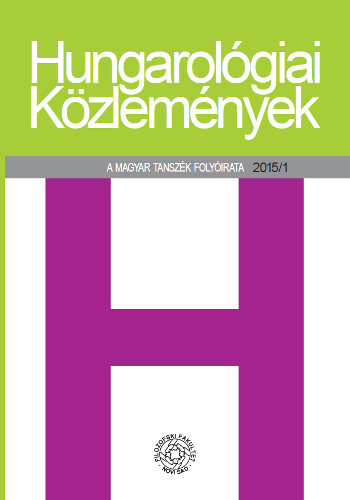Románecz Mihály pancsovai évei (1880–1899)
Years that Mihály Románecz spent at Pancsova (1880–1899)
Author(s): Ferenc MákSubject(s): Hungarian Literature
Published by: Филозофски факултет, Универзитет у Новом Саду
Keywords: 19th century Hungarian literature; literary institutions; Hungarian–Serbian literary connections; newspapers
Summary/Abstract: Mihály Románecz, who was born in Máramaros (Maramures) County, spent almost two decades in Pancsova (Pančova) as the teacher of Hungarian language and literature, Croatian-Serbian language and literature as well as history in the local Gymnasium between the years 1880–1889; in addition to his duties at school he also took part in the communal cultural and educational activities. Namely, in this Lower-Danube town, following the imperial and royal discipline of the military frontier region, the rise of the middle class and the establishment of civil society institutions started in the last decades of the 19th century. Scholars transferred from the capital: György Tordai, headmaster of the Gymnasium and teacher of geography and history, Ernő Fináczy, doctor of philosophy, the teacher of Greek and Latin philology, Zakariás Vizoly, the teacher of the history of German language and literature and Latin linguistics, János Wigand the teacher of Hungarian and German languages and history of literature and József Erdős Protestant clergyman and religion teacher had the task of developing a bourgeois image to the town inhabited by Hungarian, German and Serbian population. It was a delicate, sometimes impossible task to establish the institutions of Hungarian public administrtation; results could only be achieved if they complied with the spirit of the land. Mihály Románecz wrote a Serbian Grammar Book for his pupils, while also translating Serbian heroic ballads and historical works in order to raise awareness to the common values of cultures having lived together for centuries. It was his task as a secondary school teacher to teach Hungarian language and literature, however, by drawing examples from the past, he pointed out to his pupils the humane potentials of the intellectual construction at the turn of the century.
Journal: Hungarológiai Közlemények
- Issue Year: 16/2015
- Issue No: 1
- Page Range: 110-131
- Page Count: 22
- Language: Hungarian

